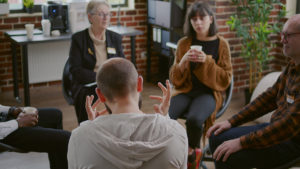A 2017 survey found that nearly 21 million persons aged 12 and older had a substance use disorder. The same study discovered that roughly 8.5 million of the above population had a co-occurring or dual diagnosis that showed both a substance use disorder and a mental disorder.
Over 80% of those affected by SUD disregard their need for care, even though they require expert treatment. There is more to quitting alcohol or drugs than simply stopping. It is a journey that begins with the desire to learn why these substances are addictive and how to avoid relapse.
It is crucial to understand that substance addiction is a disease that can control a person’s actions and judgment. A SUD impairs one’s capacity for clear vision and reasoned decision-making. People are saddened when their loved one refuses rehabilitation without considering how profoundly their attitude and conduct are impacted.
How can a friend or relative who appears to have SUD be convinced to join rehab? Read on to learn more about getting someone to go to rehab.
Steps to convince someone to go to rehab
Wanting a SUD patient to start their recovery journey makes sense for various reasons. However, personal reasons are insufficient to convince someone to embark on the arduous journey ahead of them. They need to have a connection to their potential for recovery in the future. Therefore, a thoughtful and strategic approach to the subject can be critical to them.
Here are some tips for talking to a loved one about their substance use:
Get informed about addiction
Getting informed about addiction is the first step to reviving hope for recovery. Numerous research has demonstrated that addiction rehabilitation is more significant when the family is notified and participates in the process. Try to learn much about rehab, particularly subjects that concern SUD.
Further, research more about how drug abuse and addiction harm an individual’s life. Participating in support groups and speaking with an addiction specialist can also be helpful. The primary concern should be obtaining precise responses to any questions that might come up during the rehab talk. Convincing someone to join a rehab program requires understanding how drug addiction impacts that person’s mental health.
Drug addiction treatment option is always another point of concern. Learn what takes place and what to anticipate in rehab treatment programs. It aids in easing participants’ uncertainties and decreasing their dread of enrolling in rehab facilities.
An in-depth understanding of drug addiction and recovery centers doesn’t guarantee a favorable response. They’ll typically persist in being defensive and reject significant ideas. They may also think people are overly dramatic when they want them to join rehabilitation centers. The available information can help determine the best course of treatment and help them understand how their condition affects them.
Stage an intervention
An intervention is a planned gathering when friends and family can provide a loved one with the chance to acknowledge their addiction issues and take action before things get much worse. It tries to help people prepare for and accept professional therapy.
Making plans in advance for the location, the timing, and the expected guests can be helpful. And don’t forget about the addict; try involving them when they are sober to avoid rushing. Make decisions about what is expected of each person during the preplanning stage. For instance, provide relevant examples of how addiction takes control of their life and a suitable treatment plan.
Engaged other family members and friends to advise on the best drug rehab. Having a consequence is also essential for a successful intervention strategy. It aids in outlining the potential outcome and intended action if they refuse help or to attend a rehab program. For example, it may be best to prevent them from seeing their nephew or even stop paying for their apartment.
When staging an intervention, adhere to a planned course of action and follow it if it is unsuccessful. In most instances, addicts may experience a defining moment due to these repercussions.
Avoid shame or guilt.
Other than shaming or guilt-tripping addicted loved ones, try showing compassion to them. It is not the right time to confront addicted loved ones about their behavior; instead, reach them through empathetic communication.
Haranguing or shaming them continuously brings no positive outcomes but only drives them away. It might be helpful if people focus on mending the damaged relationship with SUD patients or loved ones. This can help separate the person from their addiction.
Blame games do not address these issues; instead, they exacerbate them. So, if things get out of control, get help from a professional.
Establish boundaries
Establish a clear limit outlining the scope of intervention concerning future addictive behavior while persuading them to go to rehab. Besides, maintaining appropriate boundaries will be crucial to balancing life and other duties, such as intervention. It is best to set limits in this situation to have adequate protection while focusing on intervention for SUD individuals.
Help someone with substance abuse disorder today.
Convincing someone to go to rehab is an important development toward a healthy future. It facilitates their emotional connection, a strong basis for a successful recovery path. Never give up; always help them keep their long-term healing in mind. Even though they might not recognize the value of joining a rehab program, these people can reclaim their lives with enough support and education.
At Bellagio Rehabilitation Treatment Center, we treat people battling drug and alcohol addiction, co-occurring mental health problems, and process addictions. Our elegant facility is housed in a residential home. This setting allows patients to receive the individualized attention they need to aid their rehabilitation.
Our facility has all it takes to help them regain their life. Also, our team’s goal is to help SUD patients’ long-term recovery. In case of any questions regarding how to recover from SUD, our knowledgeable staff is available to help. Contact us to learn more about our treatment options.




